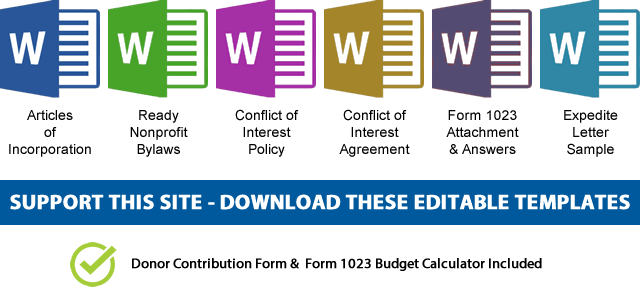If your nonprofit organization is formed to support a foreign charity or NGO, you should seek professional advice and refrain from filing the IRS Form 1023 application yourself. The reason I say that is not because many attorney’s are proficient in forming American Nonprofit Friends of Organization charities, on the contrary, the majority have never even heard of such organizations.
The main reason is that if you do start a nonprofit 501c3 tax-exempt organization using the Form 1023 yourself and do a sloppy job of establishing the facts, you’re most certainly guaranteed a rejection from the IRS.
In order to form a 501c3 Friends of Organization nonprofit charity, you need to:
- Establish that your charity is not controlled by the foreign receiving organization,
- You are independent of the foreign charity decision making,
- Majority of your nonprofit board members need to be inside the US
- No board members from the receiving entity is on your board of directors,
- That there are absolutely no conflict of interest
- You can control 100% of the donated funds to the foreign organization,
- You show and establish that you can and WILL track the outcome of U.S donated funds,
- Have a meticulous and clear process of all the above and restrict your contribution to specific programs.
That was just a short list of many IRS requirements that you need to keep in mind and practice. In my experience, these kind of nonprofit organizations should re-think their mission, try to establish actual programs, and carry them out as an independent U.S charity. Most of the time, if the foreign organization was worth its salt, they wouldn’t need American nonprofit friends to raise funds for them, so try to be better and address the issue in a more efficient way.
A supporting organization is a charity that carries out its exempt purposes by supporting other exempt organizations, usually other public charities. This classification is important because it is one means by which a charity can avoid classification as a private foundation, a status that is subject to a more restrictive regulations.
Of course, supporting another public charity is not enough by itself to warrant status as a public charity – many private foundations support public charities as well. A supporting organization generally warrants public charity status because it has a relationship with its supported organization sufficient to ensure that the supported organization is effectively supervising or paying particular attention to the operations of the supporting organization.
A supporting organization is a Type I, Type II or Type III supporting organization depending on the relationship it has with its supported organization(s). A Type III supporting organization is either functionally integrated (FISO) or non-functionally integrated (non-FISO). This distinction is important because of additional restrictions that apply to contributions and certain grants made to non-FISOs.
What is a type I supporting Organization?
A Type I supporting organization must be operated, supervised or controlled by its supported organization(s), typically by giving the supported organization(s) the power to regularly appoint or elect a majority of the directors or trustees of the supporting organization. The relationship between the supported organization(s) and the supporting organization is sometimes described as similar to a parent-subsidiary relationship.
What is a type II supporting Organization?
A Type II supporting organization must be supervised or controlled in connection with its supported organization(s), typically by having a majority of the directors or trustees of the supported organization(s) serve as a majority of the trustees or directors of the supporting organization. The relationship between the supported organization(s) and the supporting organization is sometimes described as similar to a brother-sister relationship.
What is a type III supporting Organization?
A Type III supporting organization must be operated in connection with one or more publicly supported organizations. All supporting organizations must be responsive to the needs and demands of, and must constitute an integral part of or maintain significant involvement in, their supported organizations. Type I and Type II supporting organizations are deemed to accomplish these responsiveness and integral part requirements by virtue of their control relationships. However, a Type III supporting organization is not subject to the same level of control by its supported organization(s). Therefore, in addition to a notification requirement, Type III supporting organizations must pass separate responsiveness and integral part tests.
Most supporting organizations will be classified as Private Foundations under Section 509(a)(3), and the few that survive the test will become public charities.
Should you form an American Nonprofit Friends of Organization?
The short answer is NO. Now that’s not to say that American friends of organizations are useless or impossible to form. There are many Friends of organizations that operate in the U.S and raise funds for a foreign charity or NGO, such as “Friends of the World Food Program”. World Food Program is not a U.S exempt charity, but FWFP is doing its fund raising for them, and they are exempt under the section 501c3 of the Internal Revenue Code.
As I mentioned on this site, 99% of nonprofit organization who are formed to support a specific Foreign Charity are doomed because they simply won’t or can’t adhere to these guidelines, but if you feel that you can pull it off, you can apply and successfully receive your 501c3 tax exemption.
What you’re trying to do is not typical, hence the safeguards that your funds don’t fall into wrong hands, and US taxpayer’s money is not spent on foreign nonsense.
 NOTE: If you’d like to receive the following organizing documents:
NOTE: If you’d like to receive the following organizing documents:- Nonprofit Articles of Incorporation,
- Nonprofit Bylaws,
- Nonprofit Conflict of Interest Policy,
- Conflict of Interest Policy Acknowledgment,
- Form 1023 Attachment with all the answers,
- Form 1023 Expedite Letter template,
- and Donor Contribution Form
in Microsoft Word Document format, please consider making a donation and you’ll get to download them immediately. Not only they're worth well over $1000 in value, they will save you weeks of copy pasting and formatting as they are ready to go templates which only need changing names and addresses.

